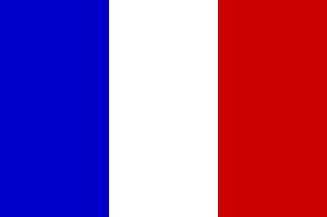 |
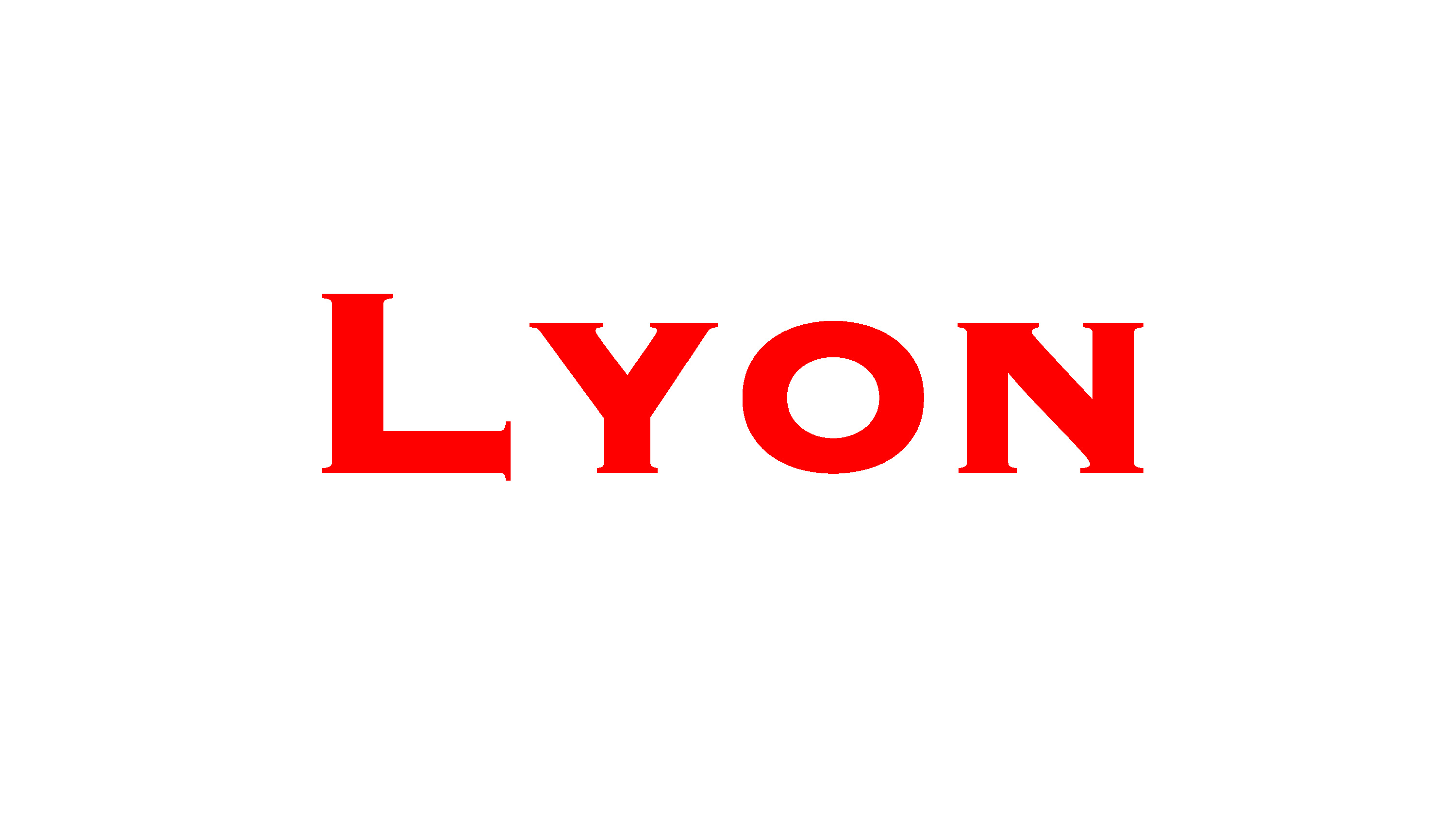 |
november 2022 |
Monday 28 November 2022
We get up around half past six and at seven we get on our way to
Rotterdam Central Station. We drink coffee at Starbucks and then go to
platform 2 for the Thalys
high speed train to Paris. We leave for Paris 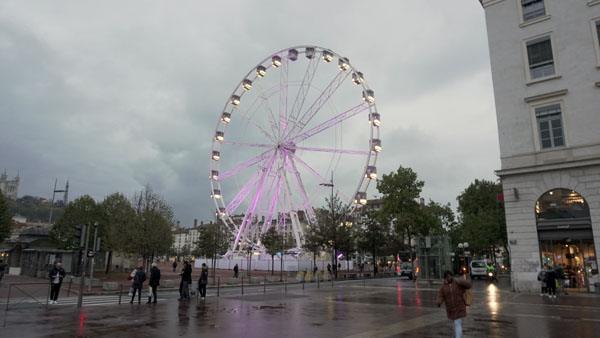 at 07:58
sharp. We arrive there at 10.38. On the train I bought tickets for the
Paris metro in the bar car. That saves a long queue in front of the
ticket machine at Gare du Nord. We walk to the platform for the RER line
D. The train arrives within 5 minutes and we ride to Gare de Lyon in 10
minutes (one intermediate stop). There we walk to departure hall 2. We
eat a sandwich and then go through the gate onto the platform to board
the double-decker TGV inoui run by SNCF
to Lyon. The train has its final destination Lyon Perrache, but we get
off one stop earlier at Lyon Part-Dieu. Behind us is a crazy woman
calling loudly and talking to herself. Later it turns out she doesn't
have a ticket for the train either. She is fined.
at 07:58
sharp. We arrive there at 10.38. On the train I bought tickets for the
Paris metro in the bar car. That saves a long queue in front of the
ticket machine at Gare du Nord. We walk to the platform for the RER line
D. The train arrives within 5 minutes and we ride to Gare de Lyon in 10
minutes (one intermediate stop). There we walk to departure hall 2. We
eat a sandwich and then go through the gate onto the platform to board
the double-decker TGV inoui run by SNCF
to Lyon. The train has its final destination Lyon Perrache, but we get
off one stop earlier at Lyon Part-Dieu. Behind us is a crazy woman
calling loudly and talking to herself. Later it turns out she doesn't
have a ticket for the train either. She is fined.
In Lyon we take the metro. We can pay contactless with ApplePay. We take
the metro to Foch (change at Charpentes). The access to the Airbnb
is rather odd. The key safe is attached to a bicycle rack, diagonally
opposite the apartment.
We get settled in and then go shopping at the SuperU supermarket around 50 meters from our front
door.
We rest a bit and then take the metro
to Place Bellecour, the central square 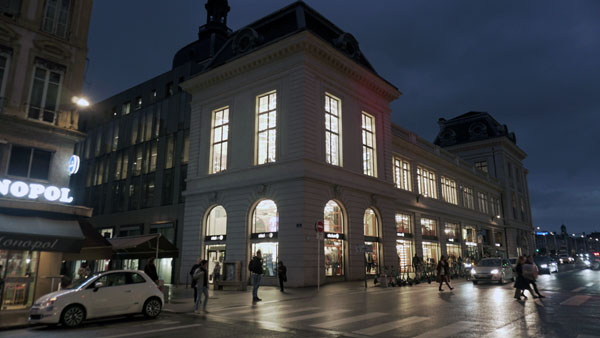 on the
Prequ'ile, the peninsula between the Saône and the Rhône rivers. The
square is huge. In the center is the equestrian statue of Louis XIV. On
the edge of the square is a sculpture of Lyon's famous son, writer and
fighter pilot St-Exupéry and his novel hero Le Petit Prince. We walk to
the Place Antonin Poncet. Here is the bell tower of a former hospital
Charité and also the main post office. We drink coffee at Café Français.
Then we walk through the rue de Maronniers, a street with many
restaurants. We then head to the Hotel Dieu, a former maternity hospital, but now
an upscale shopping center with many restaurants and bars. Then we drink
a beer with a snack at Le Republique. The fried camembert snacks are
kind of heavy. We walk to metro station Cordeliers. We take the subway
back to Foch and watch some Netflix. For dinner we walk to Brasserie de
Brotteaux. The restaurant was decorated in 1913 in Art Nouveau style and
that style has been completely preserved. We have a delicious French
meal with a nice white wine and then go back to our apartment. We watch
the tail of the World Cup football match Portugal-Uruguay (2-0).
on the
Prequ'ile, the peninsula between the Saône and the Rhône rivers. The
square is huge. In the center is the equestrian statue of Louis XIV. On
the edge of the square is a sculpture of Lyon's famous son, writer and
fighter pilot St-Exupéry and his novel hero Le Petit Prince. We walk to
the Place Antonin Poncet. Here is the bell tower of a former hospital
Charité and also the main post office. We drink coffee at Café Français.
Then we walk through the rue de Maronniers, a street with many
restaurants. We then head to the Hotel Dieu, a former maternity hospital, but now
an upscale shopping center with many restaurants and bars. Then we drink
a beer with a snack at Le Republique. The fried camembert snacks are
kind of heavy. We walk to metro station Cordeliers. We take the subway
back to Foch and watch some Netflix. For dinner we walk to Brasserie de
Brotteaux. The restaurant was decorated in 1913 in Art Nouveau style and
that style has been completely preserved. We have a delicious French
meal with a nice white wine and then go back to our apartment. We watch
the tail of the World Cup football match Portugal-Uruguay (2-0).
Weather: 10 degrees, overcast, occasional light rain.
Tuesday 29 November 2022
After breakfast we take the metro line A to Bellecour and there we
change to metro line D for 1 stop to Vieux Lyon. We drink coffee near
the metro station and wait for Jeremy,
our guide who will lead us through the old Renaissance quarter of Lyon.
He arrives on time and we first visit the St Jean St Jean Cathedral from the 12th century. The
bishop of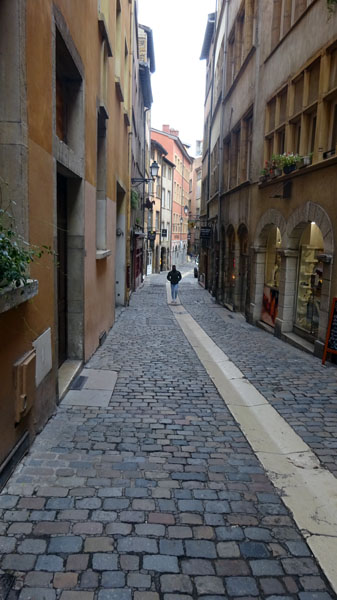 Lyon not only has the oldest episcopal see, but has been named the
primate among bishops of Gaul or France since 1079. The construction of
the church took more than 300 years and there are Romanesque and Gothic
parts to see. The astronomical clock no longer works after vandalism in
2013. The stained glass windows were shattered in 1944 when the Germans
blew up the bridges over the Saône. Most have been restored, but some
have a modern design. We walk further into the old quarter. There are
three long streets that run parallel to the Saône in the narrow space
between the river bank and the mountain on which the Romans established
their city of Lugdunum in the first century BC. Between these streets
there are only a few side streets, but many Traboules, passages
Lyon not only has the oldest episcopal see, but has been named the
primate among bishops of Gaul or France since 1079. The construction of
the church took more than 300 years and there are Romanesque and Gothic
parts to see. The astronomical clock no longer works after vandalism in
2013. The stained glass windows were shattered in 1944 when the Germans
blew up the bridges over the Saône. Most have been restored, but some
have a modern design. We walk further into the old quarter. There are
three long streets that run parallel to the Saône in the narrow space
between the river bank and the mountain on which the Romans established
their city of Lugdunum in the first century BC. Between these streets
there are only a few side streets, but many Traboules, passages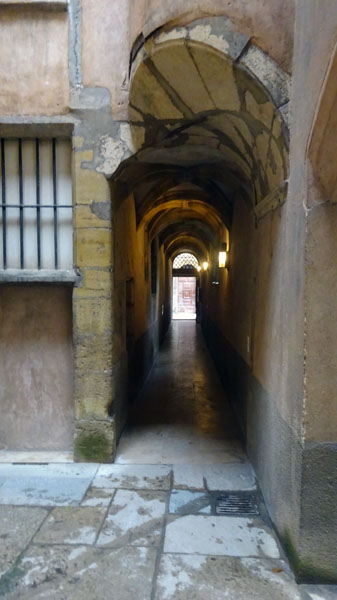 through houses via courtyards, which connect the streets. They are
inconspicuously hidden behind doors. Some are public, many private, but
you can often get in and through via the postman's service bell. In the
courtyards you will find spiral staircases with galleries that connect
the houses with the stairs. It's fascinating. The rue du Boeuf, formerly
the butcher's street, is now the street with the most starred
restaurants. Lyon calls itself the culinary capital of France. We also
see the pink tower, the most famous stairwell. It protrudes a few floors
above the attic. Done to impress. We finish at the former courthouse on
the riverbank. Here in 1987, Klaus Barbie, war criminal and called the
butcher of Lyon, was convicted of war crimes.
through houses via courtyards, which connect the streets. They are
inconspicuously hidden behind doors. Some are public, many private, but
you can often get in and through via the postman's service bell. In the
courtyards you will find spiral staircases with galleries that connect
the houses with the stairs. It's fascinating. The rue du Boeuf, formerly
the butcher's street, is now the street with the most starred
restaurants. Lyon calls itself the culinary capital of France. We also
see the pink tower, the most famous stairwell. It protrudes a few floors
above the attic. Done to impress. We finish at the former courthouse on
the riverbank. Here in 1987, Klaus Barbie, war criminal and called the
butcher of Lyon, was convicted of war crimes.
We go back to the apartment to rest. Then we go back to the old town to
have lunch at the Food
Traboule, a food court with quality restaurants. We then take the
funicular to Fouvière, the mountain on which the 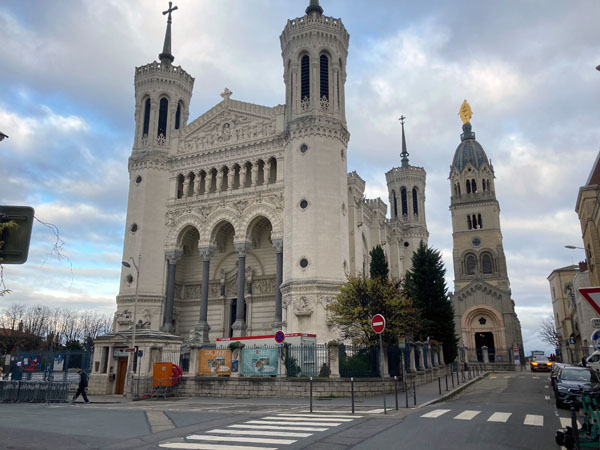 Romans
established their city of Lugdunum. Strategically located overlooking
the two rivers. We arrive at the Notre Dame de Fouviere from the 19th
century. The basilica is richly decorated with mosaics of religious and
historical events in Lyon and France. The church was built in gratitude
that the city was not destroyed by the Prussians in 1871. We drink
coffee at hotel-restaurant Bulle with a view of the city. Next to the
church is a metal tower that looks like a copy of the top floor of the
Eiffel Tower. The tower serves as a transmission tower. Then we walk to
the Roman amphitheatre, built under Augustus in 15 BC, later expanded
under Hadrian in the 2nd century AD. It could hold up to 10,000 people.
We walk back to the funicular and go back to the apartment.
Romans
established their city of Lugdunum. Strategically located overlooking
the two rivers. We arrive at the Notre Dame de Fouviere from the 19th
century. The basilica is richly decorated with mosaics of religious and
historical events in Lyon and France. The church was built in gratitude
that the city was not destroyed by the Prussians in 1871. We drink
coffee at hotel-restaurant Bulle with a view of the city. Next to the
church is a metal tower that looks like a copy of the top floor of the
Eiffel Tower. The tower serves as a transmission tower. Then we walk to
the Roman amphitheatre, built under Augustus in 15 BC, later expanded
under Hadrian in the 2nd century AD. It could hold up to 10,000 people.
We walk back to the funicular and go back to the apartment.
We watch the Netherlands-Qatar game at 4 pm. The Netherlands wins 2-0.
In the evening we eat at Le
Table Wei on the peninsula. A Franco-Asian cuisine. The chefs
studied the art with Paul Bocuse and gave it an Asian twist. Ate well.
Then back again.
Weather: cloudy. 9°C.
Wednesday 30 November 2022
We take the metro to the Croix-Rousse district. We transfer at
Hotel de Ville to line C. This is a short line and actually a mountain
railway with cogwheel. It goes steeply uphill. We get off at the Croix
Rousse square. We look for and find a pastry shop where we have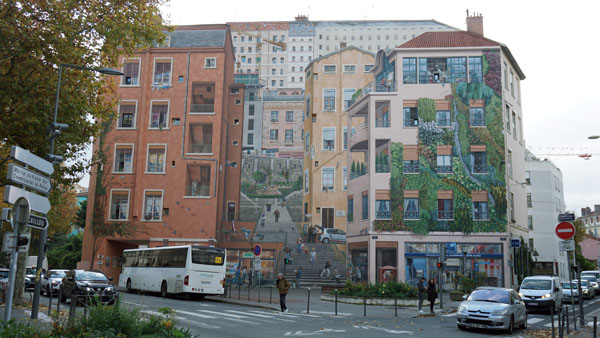 a coffee
and cake. Then we walk up the Croix Rousse street to the Maison des
Canuts, the center of the silk weavers (Canuts). Croix-Rousse had been
home to the silk industry since the 17th century, for which Lyon is
still famous. The center is still closed this early. We move on and
check out the Cinema
St Denis, an 1930s theatre with an Art Deco-style box office and
run by local volunteers. Then we walk towards Soieries Vivantes, a foundation that preserves the
heritage of the silk weavers. That too is still closed. It is now time
to walk back to the Maison
des Canuts, which opens its doors at 10 am. Here is a small
exhibition of spinning machines and looms, both manual and machine. The
mechanization put many Canuts out of work. The Canuts became militant
because of this and revolted twice (1831 and 1834) and founded the first
trade unions in France. We continue to the Mur des Canuts. That is a
mural on a blank wall of a building. The depth effect is fascinating. It
seems like you are looking at a real residential area, with stairs,
shops, apartments. It's not real. In the painting also silk weaving
shop, hence the name.
a coffee
and cake. Then we walk up the Croix Rousse street to the Maison des
Canuts, the center of the silk weavers (Canuts). Croix-Rousse had been
home to the silk industry since the 17th century, for which Lyon is
still famous. The center is still closed this early. We move on and
check out the Cinema
St Denis, an 1930s theatre with an Art Deco-style box office and
run by local volunteers. Then we walk towards Soieries Vivantes, a foundation that preserves the
heritage of the silk weavers. That too is still closed. It is now time
to walk back to the Maison
des Canuts, which opens its doors at 10 am. Here is a small
exhibition of spinning machines and looms, both manual and machine. The
mechanization put many Canuts out of work. The Canuts became militant
because of this and revolted twice (1831 and 1834) and founded the first
trade unions in France. We continue to the Mur des Canuts. That is a
mural on a blank wall of a building. The depth effect is fascinating. It
seems like you are looking at a real residential area, with stairs,
shops, apartments. It's not real. In the painting also silk weaving
shop, hence the name.
We walk further back to the place Croix Rousse. From the Place de Grand
Cailloux we have a view over the city. We continue and descend along the
slopes of the Croix Rousse to the center of the city. We walk downhill
from here. We arrive at the Traboule de Vorace. It is a modern
version of yesterday's renaissance Traboules. This is from the early
19th century. No spiral staircases, but a beautiful staircase with
straight stairs and cast iron banisters. We walk down the block and
through a tunnel to another street. We continue to another view and
arrive at the Amphitheater des Trois Gaules. Dating back to the 1st
century as a meeting place for the representatives of the three Gallic
regions. Gladiator fights were held here, Christians were tortured and
parties were organized. Caligula had his cousin Ptmolemeus murdered
there. We descend further and eventually arrive at the square in front
of the town hall. Here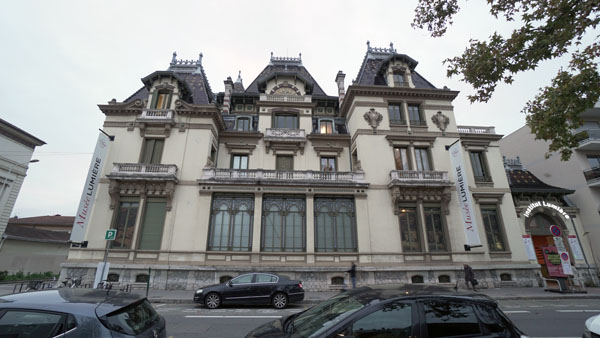 we have
lunch at an Italian place. After lunch I walk to the Fresque des
Lyonais, a mural with famous Lyonais, such as the Brothers Lumière,
Bernard Pivot, Abbé Pierre, St Exupéry and just about all other Lyon
celebrities. Then we return to the apartment.
we have
lunch at an Italian place. After lunch I walk to the Fresque des
Lyonais, a mural with famous Lyonais, such as the Brothers Lumière,
Bernard Pivot, Abbé Pierre, St Exupéry and just about all other Lyon
celebrities. Then we return to the apartment.
Later in the afternoon we take the metro to the Musee Lumière. This was the home of the
Lumière family. It functions as a museum for the Lumière Brothers, who
were among other things inventors of the moving pictures. The museum
shows their inventions and the development of the early days of cinema.
Fascinating. Behind the house were the factories of the company Lumière,
which made film material, cameras and projectors. The factory has
disappeared and made way for the Institut Lumière, a film archive with
two cinemas where historical films are shown. After the museum we drink
coffee in the Café Lumière.
We also call NS (Dutch Railways) to rebook our return journey. Our train
has been canceled due to a strike among train conductors. Fortunately,
we manage to get booked on a train that will still offers us a
connection in Paris on the Thalys to Rotterdam.
In the evening we have dinner at 7.45 pm at Les Apothicaires* , a Michelin star restaurant in
our area. We get an 8 course tasting menu. Very good. We enjoy.
Weather: 10 degrees and partly cloudy
Donderdag 1 december 2022
We take the metro to Bellecour. We drink coffee at Café de France and
then walk down rue Victor Hugo. It is still early and most shops are
still closed. At the Place Ampère we turn right. Here stands the statue
of André-Marie Ampère (1775-1836), the discoverer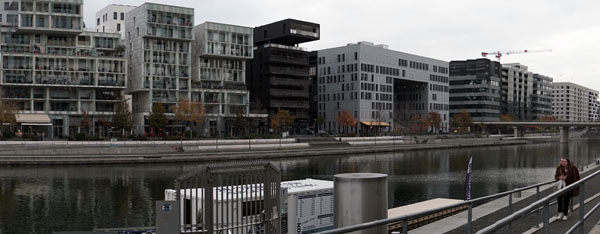 of
electromagnetism and the name giver of the unit of current strength and
also Ampere's law. He was born in a village near Lyon and worked in
Lyon. We walk past his statue towards the Abbay de St Martin d'Aunay.
That is a 12th century church. In the Middle Ages it was a powerful
abbey with more than 70 churches in the Diocese of Lyon. Kings and popes
stayed here. In the 16th century it was destroyed by the Protestants and
later restored.
of
electromagnetism and the name giver of the unit of current strength and
also Ampere's law. He was born in a village near Lyon and worked in
Lyon. We walk past his statue towards the Abbay de St Martin d'Aunay.
That is a 12th century church. In the Middle Ages it was a powerful
abbey with more than 70 churches in the Diocese of Lyon. Kings and popes
stayed here. In the 16th century it was destroyed by the Protestants and
later restored.
The church is Romanesque inside and most of the art is in and around the
choir, including a beautiful fresco. We continue towards Perrache
station and rent a bicycle from the Velo’V bicycle sharing system. We drive through
the railway underpass and then to the banks of the Saône towards the Confluence,
the point where the Saône 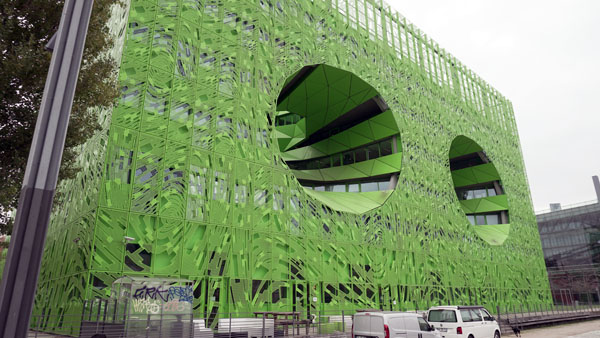 merges with the
Rhône. This former port and industrial area has been redeveloped since
2010 for offices and apartments with spectacular architecture. At an
inner harbor we see Le Monolithe, a design by the Rotterdam architects
of MVRDV. A little further on, a shopping center and a green cube for
the news channel Euronews, which has its studios here. We cycle on to
the confluence, where the museum of the same name is also located. We
park the bicycle and visit the museum. It is a spectacular design by an Austrian
agency. We take the escalator up to where the permanent exhibition is.
Its theme is the origin of humanity. There are four rooms: the origin,
the species, society and the future. The set-up is eclectic and
interesting, but the room on society is rather a hotch potch. We then
eat in the brasserie of the museum. After lunch we take the tram T1 back
to Charpenne. A long ride through the Confluence district and then again
across the Rhone towards Part Dieu. We do the last part to Foch by
metro.
merges with the
Rhône. This former port and industrial area has been redeveloped since
2010 for offices and apartments with spectacular architecture. At an
inner harbor we see Le Monolithe, a design by the Rotterdam architects
of MVRDV. A little further on, a shopping center and a green cube for
the news channel Euronews, which has its studios here. We cycle on to
the confluence, where the museum of the same name is also located. We
park the bicycle and visit the museum. It is a spectacular design by an Austrian
agency. We take the escalator up to where the permanent exhibition is.
Its theme is the origin of humanity. There are four rooms: the origin,
the species, society and the future. The set-up is eclectic and
interesting, but the room on society is rather a hotch potch. We then
eat in the brasserie of the museum. After lunch we take the tram T1 back
to Charpenne. A long ride through the Confluence district and then again
across the Rhone towards Part Dieu. We do the last part to Foch by
metro.
We rest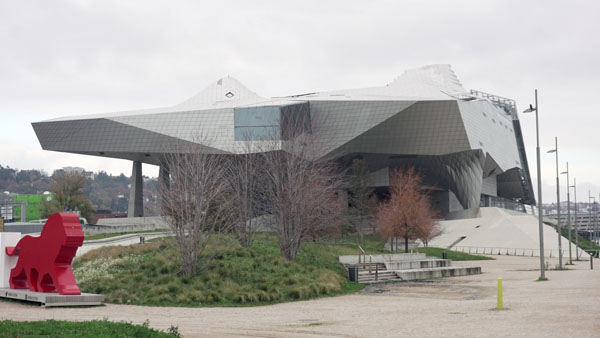 and later in the afternoon go
to Les
Halles de Lyon Paul Bocuse. It is a 7 minute walk from our
apartment. The hall is a collection of exquisite deli vendors selling
cheeses, vegetables, fruits, meats, cold cuts, sausages, wine, seafood
and fish. There are also ready-made typical Lyonaise dishes for sale. A
number of traders, especially the oyster sellers, have a sit down area
for consuming oysters and a glass of wine. It is a culinary paradise.
The chefs of Lyonaise restaurants buy their ingredients here. We sit
down for a Chausson, a kind of empanada with a glass of wine. We buy
also a Brioche Praluline, marzipan and a slice of wild boar pâté.
and later in the afternoon go
to Les
Halles de Lyon Paul Bocuse. It is a 7 minute walk from our
apartment. The hall is a collection of exquisite deli vendors selling
cheeses, vegetables, fruits, meats, cold cuts, sausages, wine, seafood
and fish. There are also ready-made typical Lyonaise dishes for sale. A
number of traders, especially the oyster sellers, have a sit down area
for consuming oysters and a glass of wine. It is a culinary paradise.
The chefs of Lyonaise restaurants buy their ingredients here. We sit
down for a Chausson, a kind of empanada with a glass of wine. We buy
also a Brioche Praluline, marzipan and a slice of wild boar pâté.
Then back to the apartment.
In the evening we eat in the Bouchon Daniel et Denise of chef Viola, bearer of the
title of Meilleur Ouvrier de France. And he is proud of that. The place
is full of photos of the chef with famous guests such as Emmanuel Macron
and we also see one of the singer Dave. I take two typical Lyonaise
dishes: the Paté en Croute (paté cooked in a bread crust) and Quenelles
(pike fish ball in a shrimp sauce). I finish with a Baba ivre de rhum.
Satisfied we return to the apartment.
Weather: heavily clouded 6 degrees.
Friday 2 December 2022
After breakfast and coffee, we take the metro to Lyon Part-Dieu station. I'm not completely sure about the journey home, because our train is not listed in SNCF's train planner. It is in Trenitalia's, but well… When we arrive at the station, the train from Milan to Paris is listed to be on the screens. The train is on time, but the platform is still unknown. Departure time 11:24 am. We drink coffee and eat a sandwich. Then very shortly before departure it becomes clear where we need to be. Platform J. When we arrive at the platform, we see the train pulling in. The Italian high-speed train, Frecciarossa, departs on time and also arrives in Paris on time. From Gare de Lyon we take the RER line D to Gare du Nord. There we have to wait another 40 minutes for the Thalys to the Netherlands. We drink coffee at Starbucks. Then we can get on the train. We leave on time, but arrive in Rotterdam 10 minutes late after delays in Belgium. We take an Uber home. We are home before 5 pm.
Weer: cloudy, 4 degraden.